From Texas to Turkey and Back Once
More
Article and photos by Jonathon
Engels
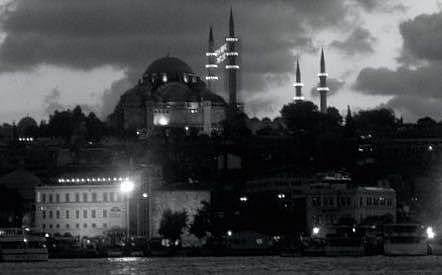
|
|
Nighttime view
from the Galata Bridge, Istanbul, Turkey.
|
Most expats I've met eventually run into the same problem: They've left a lifetime of family and friends behind, moved seemingly (sometimes literally) across the planet, and have fallen off the radar. We've lost touch with our roots, often by choice, and our loved ones grow increasingly distant geographically and emotionally. Despite several goodbye parties in which friends and relatives cooed over the prospect of visiting, hardly anyone, if anyone, has come to visit.
Such was never the case with my father. He wished me all the best, with a slightly confused look as if to say, "How in the hell did he get a job in Korea," and basically told me he'd see me when I returned. There was never any, "No way you'll get me over there eating that food" or "I love America too much for that." It was just inferred. I'd made him try sushi in a Japanese restaurant in suburban Houston, and for him, that was close enough to Korea.
What neither of us realized at the time was that I wasn't coming home. The stay in South Korea was supposed to last one year, and turned into two and a half. I met a punky little British girl who made me even more liberal, to my father's chagrin, than I already was. After that, visiting "home" was split between the US and England. Following South Korea, I moved to Guatemala. After Guatemala, and nearly three years later, with only two trips back to the US, I headed to Turkey.
Background Checks for Us All
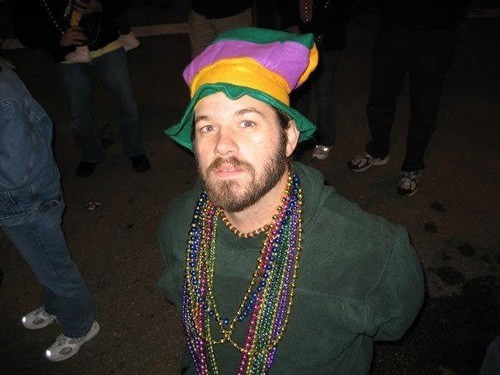
|
|
The funny thing about leaving home, even if you are happy to be gone, is that you grow in your love of the things that define a place, upon reflection — perhaps to a fault. Nothing says Louisiana like Mardi Gras.
|
I grew up in Louisiana. My father has since moved to Texas, where he finished his career working at the ExxonMobil headquarters. Most of my family and most of their friends supported George W. Bush until his final day in office, had weaponry strewn about the house, and would only protest if it was regarding the release of Michael Moore's next film. They are my family and welcome me with a brand of hospitality I've only ever experienced in the South. Still, a global world not modeled after a conservative America seems wrong to them.
Turkey is over 90% Muslim, but unlike many Middle Eastern countries, it is secular. In the 1920s, Kemal Ataturk, the first Turkish president — so revered it's illegal to speak negatively of him, and all classrooms must have his portrait hanging in them — strove to make the country more European. Turkey gave the US a second stronghold in the Middle East during the Iraq wars, a next-door launching base. Turkey has never been communist and has always had beer and churches. Even so, it was still probably not high on my father's list of places for me to go.
My dad actually lived in the Middle East — Iran — as a child. My grandfather, also an oilman, had packed up his wife, three boys, and a girl and moved them abroad for two years so that he could bag big bucks on a new project in the Middle East. Throughout my childhood, my father spoke fondly of life there: climbing date trees to steal a snack, running away from the principal at school until they called my grandfather to catch him, or drinking unlimited cold drinks at the restaurant near their house. He also loves to tell how, as a seven-year-old returning from Iran, he ordered and received a beer in Germany. However, the fondness of those memories never inspired him to take an around-the-world trip or even another excursion over the border.

|
|
Native foods play such a vital role in any culture. They are undoubtedly part of what makes each place unique, special, and unforgettable. It was certainly that way for my father, who also fondly remembered the flatbreads he'd eaten as a child.
|
I credit my father's wife, Melanie, for what happened. In fact, I didn't have to do too much of anything, and my father had barely even mentioned Turkey as an option. Melanie had purchased their tickets, researched Istanbul, and prepped my dad for leaving the country after so long. When he went to renew his passport, he brought in his last one from the 1960s, received as a little boy heading to Iran. Though he did shave his puffy white beard, my dad still looked relatively close to his age: about 60. He told the woman he wanted a renewal. For some reason, she needed a more recent ID. In the end, the government decided to issue him a new one.
Exciting Times Haven’t Changed
All That Much
They say that culture shock has specific stages, the first of which is the honeymoon phase when all things foreign are inexhaustibly fascinating. Usually, this cultural high lasts approximately three months, after which the redundancy of ordering the same three dishes, looking at the same collection of regionally flavored souvenirs, and not becoming instantly fluent with the language wears thin. Though they were no longer newlyweds, Melanie, especially my father, might as well have been on their honeymoon. I'd not seen him so excited…anywhere.
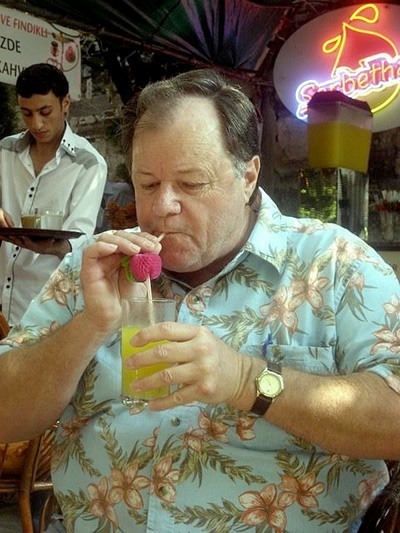
|
|
Freshly squeezed lemonade, often with fresh sprigs of mint, is a favorite refreshment in Turkey, and every time I visited Sultanhamet in Istanbul, I felt the urge to stop by this cafe. My dad liked it, too.
|
On the flight over, he'd revisited his childhood when the in-flight meal included individually wrapped, candied dates. It was not exactly like climbing the trees to pick them. Still, I don't think he'd eaten dates since Iran (They aren't exactly Texas-Louisiana delicacies.). They were every bit as delicious as he remembered. On their first night, we took them to Babi-Ali, our favorite local bar. We introduced my father to 700ml beers (the equivalent to the US's 40 oz.) and taught him to play tavla, a.k.a. backgammon, found at any good bar in Turkey. "This is neat," he kept repeating. Our one-bedroom apartment, our street in Tarlabasha, Istanbul's infamous Kurdish ghetto, our toaster oven, and only range — all were neat to my father.
My father had arrived in the evening after the oppressive heat of July in Istanbul had dissipated a little. We'd taken him to the bar only a few blocks from the apartment. The mugs at this particular spot, and only this one in my experience of Istanbul, come in Texas-sized glasses that border on novelty. My wife Emma — the punky, little British girl — had to use both hands to lift them for a sip. The walk home had been all downhill, and I showed him the nighttime view from the balcony of our apartment. Things had gone so impossibly well I was thinking they were neat.
Some streets in San Francisco seem impossibly steep, where driving uphill requires a hand on the emergency brake while never shifting out of first gear. There are streets in Istanbul with a similar gradient but entirely pedestrian. My father — too polite to insult my lack of a car, an unthinkable absence in his world, or even to doubt my thriftiness regarding taxis — seemed to be cursing me between heaving breaths, his face glowing. The amount of sweat would have suggested a marathon. We were about halfway up the hill when he officially stopped having fun.
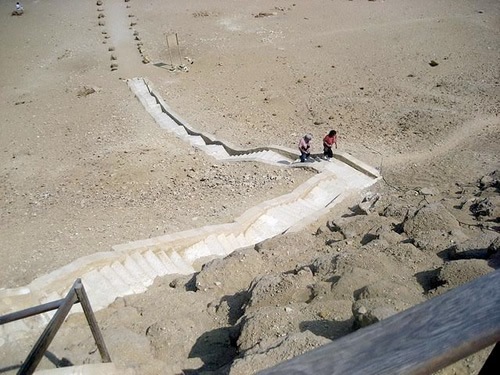
|
|
As if it weren't enough of an uphill battle to get my father out of the US into an uncomfortable culture, there seemed to be another uphill battle for him to conquer every day.
|
I regretted not showing him the funicular from the Galata Bridge to Istiklal Street, the second oldest subway in the world that was ticking along beneath his feet as he overheated. I wonder if that principal who chased him around the pool in Iran ever flashed through his brain during those heart-pounding, hard-breathing moments. Each time the school officials had come close to catching him — my father would boast with a laugh — he'd dive in the pool and swim to the other side. At that moment, he could've really used that pool again.
The Massive Differences Between Texas and Turkey
Texas, like Turkey, is hot, but there are some massive differences. No lie, my father's house is so cold in the Texas summer that I periodically go outside to warm up. In Turkey, the buildings are constructed comfortably during the heat but not frigid. We didn't have an A/C in our apartment or any restaurant, supermarket, or tourist attraction. My father, to his credit, sucked it up and laid on our living room floor, which we'd stylishly furnished with big pillows rather than a sofa or chairs, remarking at how reasonably comfortable we had made the space. Unfortunately, he never fully recovered from that walk and showed little interest in seeing more of Istanbul than we'd seen the first evening.
As much as my father's life is centered on beating the heat, he loves nothing better than a Dr. Pepper in a gigantic glass filled with crushed, not cubed, ice. He also likes cherry-flavored stuff, so I was excited to show him my favorite local drink: cherry soda water. Cherry soda water is popular and comes in these little green 4-ounce bottles. He'd liked it, but it was the equivalent of giving a drunk a shot of beer — not exactly going to quench his thirst. Instead, as we sat in the natural coolness of a café-bar, he ordered a 7-Up and another, undeterred by drinks not being bottomless in Turkey or anywhere outside the US.
Watching my father struggle, I was acutely aware of his sacrifices. Our one-bedroom apartment, a two-story design with a bed and bath up top, had no doors. Even though Emma and I were sleeping on the living room pillows, we still betrayed his privacy with every midnight bathroom trip or snore expelled. Nor did we have a satellite or even a big screen TV to blurt out the seemingly endless loop of news in digital surround sound, as in my father's house and his architecturally planned "man cave" garage with no cars. Instead, he was reduced to watching on my 14" computer screen and a collection of pirated movies from an external hard drive.
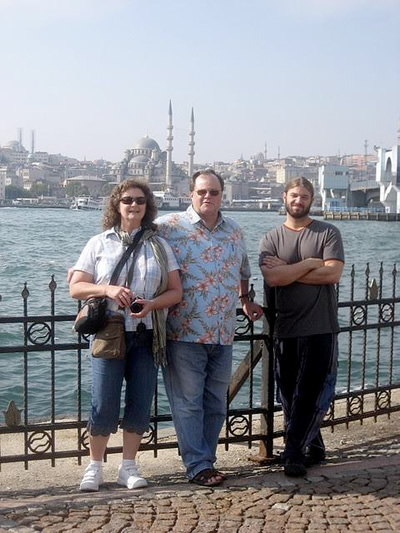
|
|
One of the most satisfying aspects about having a visitor is showing them around a place beyond the major tourist thoroughfares, so it was fantastic to reveal to my father sides of Istanbul regular vacationers probably don't see.
|
I cannot stress enough the fact that he never once complained. Not even when squeezed into the overflowing tram service in Sultanahmet, or when taking an overnight bus to reach Efes, or at the Turkish restaurant where the waitress had delivered him a plate of strange cheeses, something yogurt with herbs in it, a boiled egg, and mystery slush of sauces with baskets of French bread — for breakfast. It had been my recommendation. He was accepting, tolerant, patient, hungry, and thirsty but obligingly open to just about everything I'd thrown his way, just as he had been in that sushi restaurant years before.
Pushing Boundaries and Crossing
Borders
When I discovered my father was coming to see me, I wanted to make the most of getting him out of the country. Rather than settling for Turkey, I arranged for us all to go for a long weekend in Cairo. The Great Pyramids of Giza seemed an obvious crowd-pleaser and an experience my father would easily be able to take home with a sense of accomplishment. Being a little mischievous, I booked us all into a hostel rather than a deluxe hotel, wanting my 60-year-old father to experience the life I'd grown accustomed to — that of a backpacking vagabond.
(In retrospect, doing so was largely unfair of me, considering that I had years to adopt and adapt to this style of living. Like my father, I had once been a maestro of air conditioning. I had never tasted Arabic coffee, which he tried and would have likely been largely put off by the idea. He was being a good sport, going along with what I believe was turning out to be a long vacation for him, and in my wiser, current version, I would not have pulled this stunt with my father or any of my family members for that matter.)
As a city, Cairo was disappointing, even for me, at least where I had arranged to stay. It seemed dirty and ugly. Although it was a short walk to the Nile River and right around the corner from The Egyptian Museum of Antiquities, there was a noticeable lack of restaurants, few shops, no bars, and only non-alcoholic beer. The whole experience sucked. The hostel was even shabby. On the fourth floor of a derelict building, the hostel had a clicking, clanking elevator and an entranceway that brought to mind the love motels in Korea. I also wasn't entirely comfortable walking around the neighborhood.
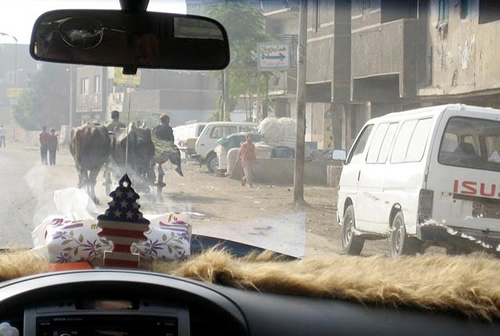
|
|
I couldn't help but wonder what my father was thinking as we drove through some of the impoverished areas in and around Cairo, the types of places to which I've long grown accustomed but that he had never seen. He never mentioned much about it.
|
The low point of the trip was when my father climbed the north face of the Red Pyramid and descended the long, narrow tunnel (roughly 3 feet by 4 feet and 200 feet long) inside. Egypt, without a doubt, is hotter than Turkey, even hotter inside a poorly ventilated pyramid tomb, and even hotter when crouched over with no option to stand, with a long way to descend to the end and an even more taxing route to ascend back to the entrance. After that, my dad was done with Egypt. He explored Cairo with me only sparingly in the days following. Still, for the most part, he wanted to stay in the hostel room, which, by some act of some God, had a window unit air conditioner.
(A close second to the Red Pyramid as an unpleasant experience occurred when my father had to shower in the shared bathroom of our hostel. It was the smallest shower I've ever seen and a tight fit for my 180-pound frame. My dad is 250, a bit germ-phobic, and insanely hygienic. In between uncontrollable laughter at the thought of it, I truly felt for him, and whatever desire I'd had to test his resolve slinked away down that shower's drain. Luckily, he's much more mild-mannered than he was 30 years ago. Not only did he not get angry with me, he even shared a weary chuckle about it.)
On our last night in Egypt, I wisely relented and offered my father a tourist experience designed for comfort: A nighttime buffet cruise on the Nile. There was crappy Las Vegas lounge-style entertainment with Cairo twists, such as belly dancing and a performance-based (not religious) whirling dervish with a tear-away outfit that he twirled above his head. However, there was expensive beer, and the cool night air flowed over the ship's deck. For a moment, my father was genuinely able to enjoy himself. I wished then that I'd tried less to share my life experience abroad and showed him a good time more suited to his tastes.
Going Home a Changed Man
I wonder if my father went home a changed man. If anything, I think he was only pushed further into his resolve that there is no reason to leave the USA. Moreover, he hasn't left the country since, something for which I at least partially blame myself. In fact, he now has only moved deeper into Texas, the rural nothingness and strip malls of the land between Dallas and Houston, over an hour away from any international airport. He has built a thickly insulated house with a grossly oversized air-conditioning unit and plenty of floor space and bedroom doors. His neighbors also retired, ride around in fancy golf carts with little lapdogs and stop by for quick chats. He lives comfortably and happily, not a financial concern in the world, something he worked for his entire life.
When I go home now, I must go to a place that means nothing to me in a town (Kerens) where, though people are friendly in a rural Texas way, they like showing you a gun collection or making slightly off-color jokes. I don't know a soul, and it's a 30-minute drive to the nearest supermarket (forget the bazaars of Istanbul). The last time I visited, I'd been working at a remote mountain hostel for six months, embracing the opportunity to sport a high-standing Mohawk. It was a look that made no sense in Kerens (pronounced Kurns, not Karens). My dad still seemed to appreciate its humor. At least he still took me to places and introduced me as his son.
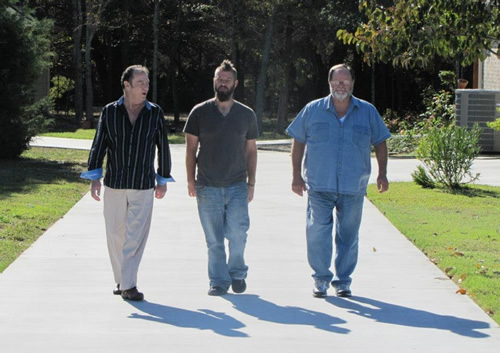
|
|
Coincidentally,
Coincidentally, my father-in-law (a Brit) is obsessed with American history, especially the West, so it was eye-opening to see him enthralled in the boots and buckles of Texas. He's visited twice now and hopes for a third time in Kerens?
|
Being in Kerens is much like I imagine Turkey was for my father; it is a peculiar delicacy of culture for which I have no desire to develop in my appreciation. This land deep in Texas is a puzzle wherein, despite all the open spaces, there is not enough vacancy for all the pieces that make up my identity. I've learned much from my father's lone visit in my near decade of living abroad and equally from visits to see him. I know my father is very content with who and where he is, and no hostels, pyramids, or kebabs will change his reality. I know I am the one who returned the changed man. I see the world as a vast and varied place and find ways to welcome everyone wherever they choose, whether in Texas or Turkey.
I know that my father — much like the overwhelming majority of my friends and family who once doted over the thought of visiting me abroad — will likely never come to my house again, and that is something I'm still learning to carry with me.

|
Jonathon
Engels earned an MFA in creative writing.
He has lived, worked and/or volunteered in seven
different countries, traveling his way through
nearly 40 countries between them. His many interests include permaculture, veganism, and ways to live sustainably.
|
|
